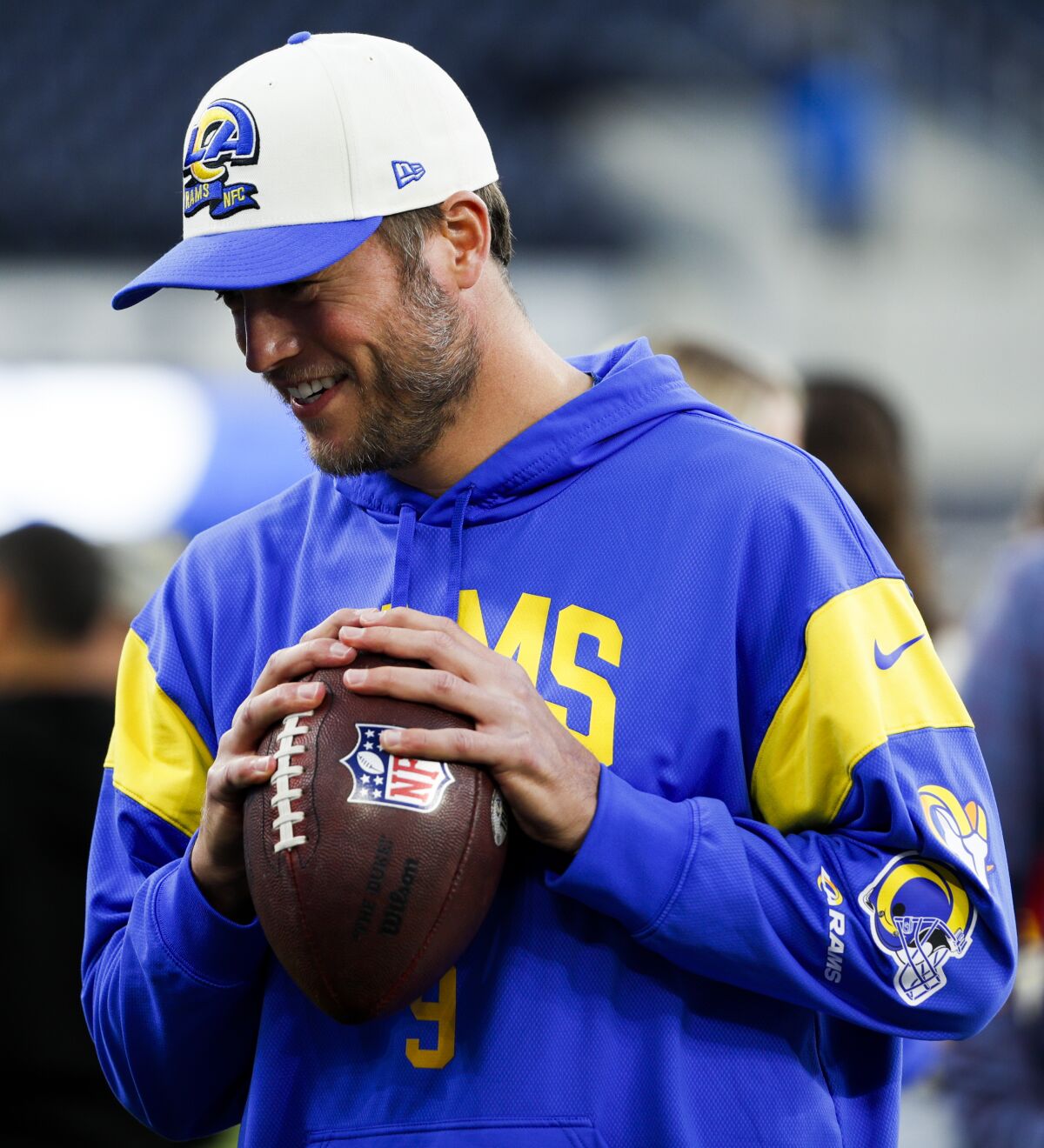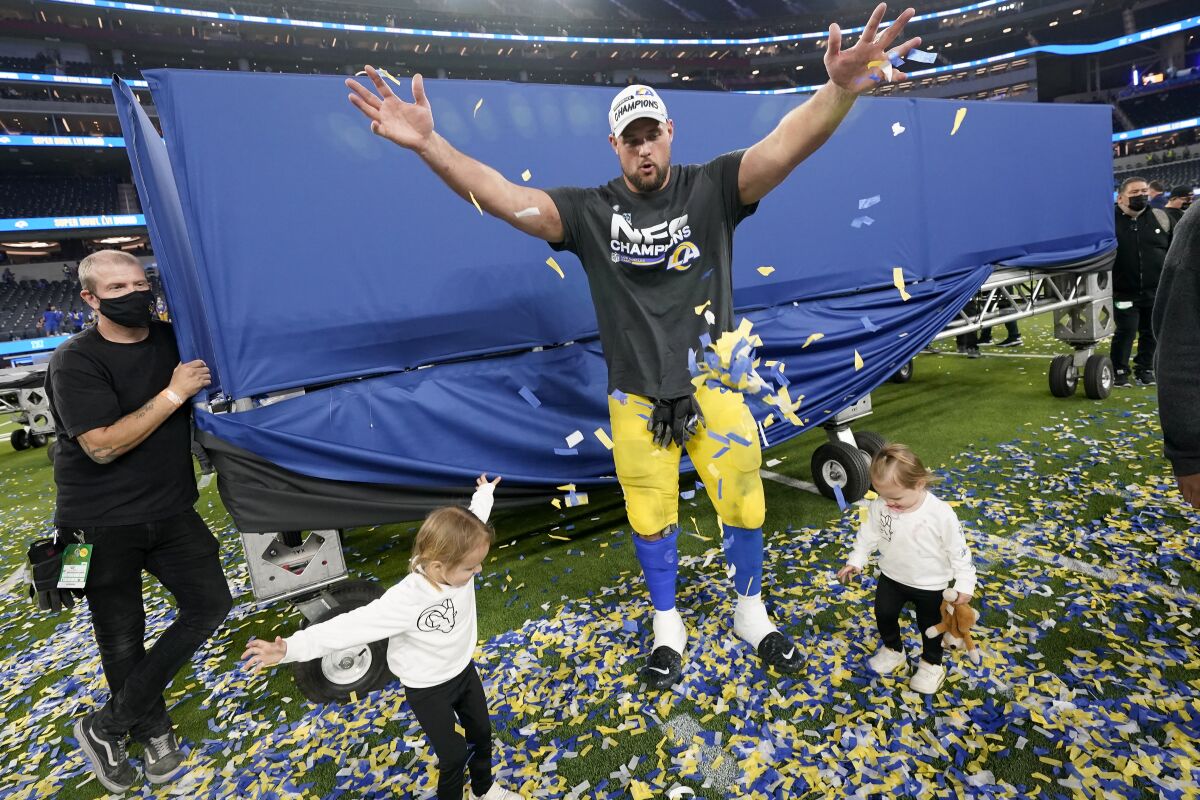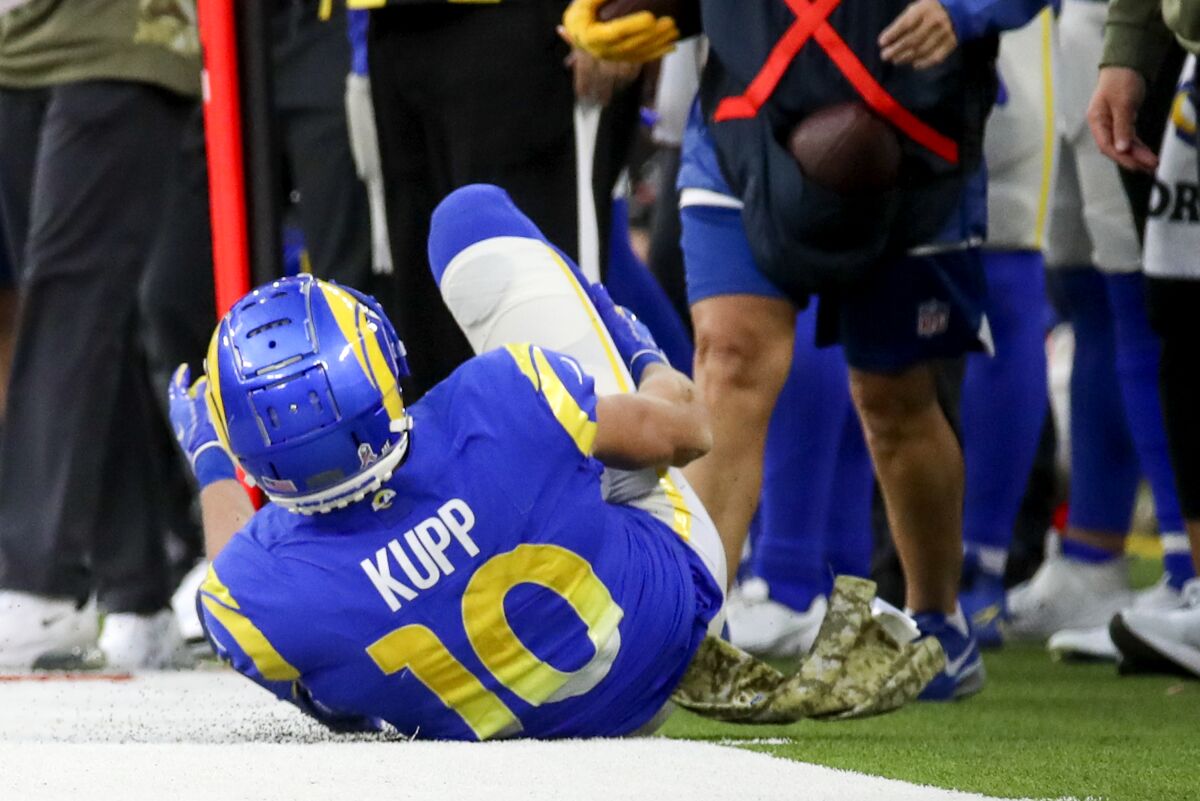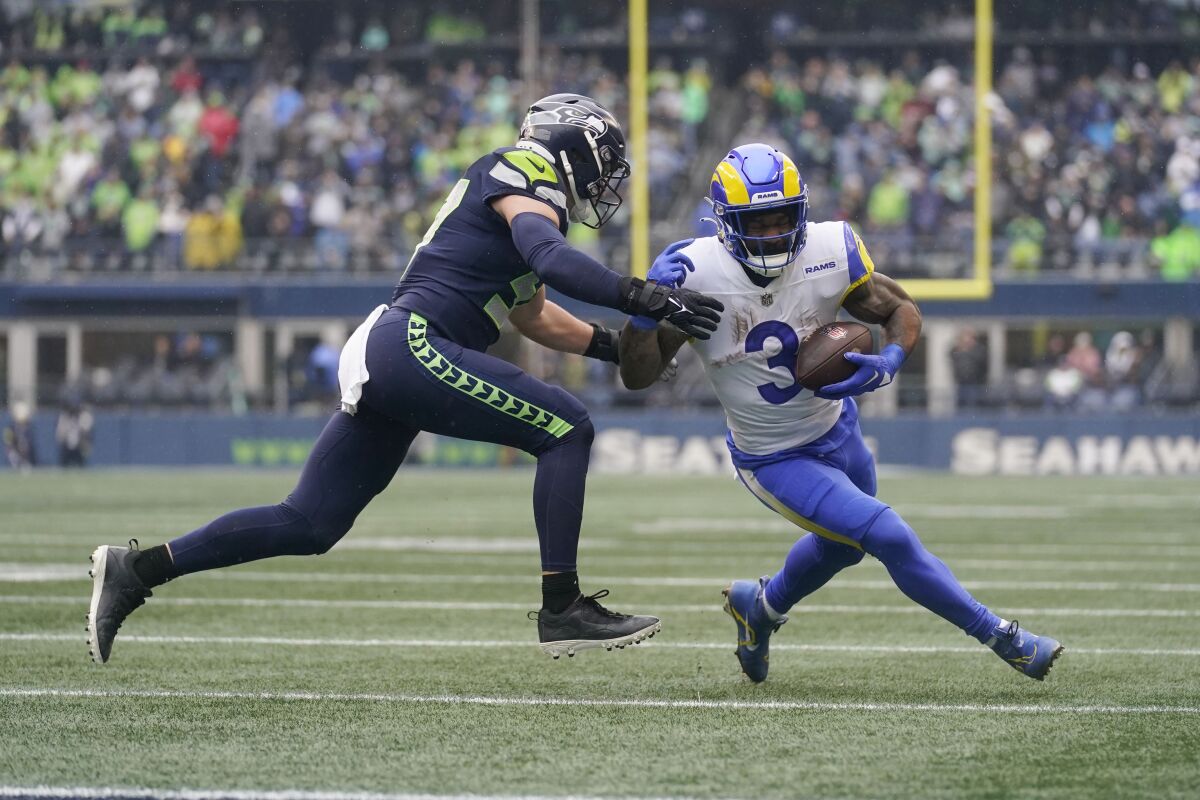Examining Rams’ super collapse after season-closing overtime loss to Seattle
As the defending Super Bowl champion Rams sank deeper and deeper into irrelevancy during their lost season, one thing remained constant.
Each week, as losses and injuries mounted, coach Sean McVay conducted a videoconference with reporters from his office, a message plastered on the wall above his head:
URGENT ENJOYMENT
Little, if anything, was enjoyable for McVay, who wore a pained or anxious expression throughout a disappointing season that ended Sunday with a 19-16 overtime defeat to the Seattle Seahawks at Lumen Field.
“This year has been, in my opinion from just what I can control, professional failure,” McVay said last week, clarifying a few days later, “That doesn’t mean that I feel like a failure. It means that we haven’t lived up to the expectations.”
How did a team that frolicked in celebratory confetti last February nosedive to a 5-12 record, the worst season-after performance by a Super Bowl champion in history? How did an organization that proclaimed its intention to “Run it Back” after winning the title at SoFi Stadium stumble instead to a season of ruin?
McVay is wont to say, “there’s a lot of layers.” And that certainly was the case for the 2022 Rams.
Here is a look at why it went so wrong:
Rams won Super Bowl LVI
That’s the point, right?
The Rams went all-in during their boom-or-bust 2021 season. The result was boom times for a franchise that reached the NFL zenith six seasons after leaving St. Louis to return to Los Angeles.
But winning a Super Bowl comes with costs not easily quantifiable.
Consider that no team has repeated as champion since the 2004 New England Patriots.
In the 2021 season, the Rams played 21 games. The season did not end until their Feb. 13 victory over the Cincinnati Bengals.
The long haul made for a short offseason. It affected the rest and recovery of all players, and the rehabilitation time for many, especially those who had surgery.
“I had surgery right after we celebrated,” said edge rusher Leonard Floyd, who had an ankle procedure. “So, not really too much time at all.”
The Rams also experienced huge turnover on the coaching staff. Seven assistants parlayed the team’s success into jobs elsewhere. The short turnaround affected the pool of available candidates to replace them, and the time new coaches had to acclimate with the staff and players.
“You aren’t able to develop the foundational elements of how you want to operate on both sides, nor provide probably the clarity of exactly what is needed for people that maybe haven’t been here,” McVay said. “That’s no one’s responsibility but my own.”
All of that matters for a team trying to win a Super Bowl, let alone two in a row.
McVay was overwrought
No one can question McVay’s maniacal commitment to competition and to winning.
Though gifted with a near photographic memory, he is not a robot with a spike in his hair. He is a human being just more than two weeks from turning 37.
McVay needed a break after the Super Bowl — and though he tried, it did not appear he truly got one.
His fatigue was evident the morning after, when Times columnist Dylan Hernandez asked the sleepless coach if he would return this season.
“We’ll see,” McVay said.
Sure, McVay had been up all night celebrating, but his countenance went beyond overindulgence. He appeared in desperate need of time off, perhaps the first harbinger of the team’s Super Bowl hangover.
McVay flirted with but turned down potential multimillion-dollar offers to leave the sideline for a broadcasting gig. He signed a new contract that made him one of the league’s highest-paid coaches. He filmed commercials. And he helped support fiancé Veronika Khomyn and her family as they dealt with Russia’s invasion of Ukraine.
McVay also bought a $14-million home in Hidden Hills, and the couple married the weekend before the Rams concluded their offseason program.
Six weeks later, the whirlwind offseason ended. Training camp, and preparation for what would become a nightmare season, began.
Last week, McVay acknowledged that he remains interested in television work down the line. Asked how he managed speculation about broadcasting opportunities, he ended a reply with a phrase that sent chills down the spines of Rams fans.
“I want to be here right now,” he said, “focus on that, and that’s where I’m at.”
Right now? That was the phrase he famously invoked after the 2020 season regarding Jared Goff’s status as the Rams starting quarterback. Two weeks later, McVay and general manager Les Snead traded Goff and two-first-round draft picks to the Detroit Lions for Matthew Stafford.
Asked after Sunday’s defeat if he would coach the Rams next season, McVay reiterated, “I’m right here, right now and we’ll deal with that stuff at a later time.”
Does he have a timeline for a decision?
“I don’t,” he said. “I don’t right now.”
Matthew Stafford’s saga
A month after leading the Rams to a Super Bowl title, Stafford winked at the camera during an omnipresent cellphone company commercial and delivered the line “Life changing.”
The condition of Stafford’s then-sore right elbow changed the trajectory of the Rams’ season.
Stafford, 34, had played through the Super Bowl with tendinitis, and he received an injection afterward to help alleviate the condition.
The Rams gave Stafford a $120-million extension and then essentially shut him down for offseason workouts. He took snaps with the offense but did not throw passes.

Rams quarterback Matthew Stafford was out of uniform quite a bit this season.
(Gina Ferazzi / Los Angeles Times)
That meant Stafford could not establish timing or a rapport with new receiver Allen Robinson. He could not try out new wrinkles with reigning NFL offensive player of the year Cooper Kupp. The offensive line was unable to work completely in concert.
“It definitely had an impact,” McVay said. “Without a doubt.”
Stafford’s workload during training camp also was limited. Before the opener against the Buffalo Bills, he said he felt great and was ready to play.
“Can always be better,” he said. “Can always try to feel like I’m 21 again. I’ll keep trying.”
Stafford was sacked seven times in an embarrassing 31-10 defeat to the Bills, but his arm strength appeared normal through six games. His statistical performance, however, paled when compared to the previous season and the offense never consistently clicked.
A few days after he was sacked four times in a defeat by the Tampa Bay Buccaneers, Stafford was put in concussion protocol. He sat out one game, and then returned to start against the New Orleans Saints.
But after being sacked, he left that game and was put into concussion protocol after telling coaches he felt numbness in his legs. McVay has said that Stafford suffered a spinal cord contusion.
Stafford was put on injured reserve and sat out the rest of the season, raising speculation that he might retire.
Stafford is scheduled to speak with reporters Monday. Asked Sunday if Stafford and star defensive lineman Aaron Donald would return in 2023, McVay did not offer any guarantees.
“We just finished up the season,” McVay said, “so we’ll work through all that kind of stuff, and you’ll have clarity on that sooner than later, I’m sure.”
All down the line
Rob Havenstein is the last man standing.
Make that the only one.
In 2018, Havenstein was part of a Rams offensive line that featured the same starting five in every game. This season, the veteran right tackle was the only starter to do so as linemen went down seemingly every week.
“A lot of injuries,” Havenstein said. “A lot of unfortunate things happened.”
It began in the preseason when Logan Bruss, the Rams’ top pick in the 2022 draft, suffered a season-ending knee injury.

After the champion Rams had their top five lineman start every game last season, Rob Havenstein (shown celebrating last season) was the only offensive lineman to start every game this season.
(Elaine Thompson / Associated Press)
In the season-opening rout by the Bills, center Brian Allen suffered a knee injury, forcing Coleman Shelton to move from right guard to center. On the first play of the next game, right guard Tremayne Anchrum suffered a season-ending ankle injury.
From there, other lineman lost for the season or extended periods included Shelton, tackles Joe Noteboom and Alaric Jackson, and guards David Edwards and Chandler Brewer.
The Rams played the Dallas Cowboys with fourth-string center Jeremiah Kolone trying to keep sack machine Micah Parsons at bay.
They finished the season with three starting linemen — left tackle Ty Nsehke, left guard Matt Skura and right guard Oday Aboushi — who were not on the roster at the start of the season.
The line’s collapse affected everything.
The running game went nowhere. Stafford was under constant duress. The offense’s inability to stay on the field fatigued the defense.
And yes, Snead is all too aware that center Creed Humphrey has started every game for the Kansas City Chiefs since Snead and McVay picked receiver Tutu Atwell ahead of him in the second round of the 2021 draft.
Ones that got away
Business 101 in the NFL: It’s nearly impossible to keep a Super Bowl team — or any team — together because of economics and annual roster shuffling.
The Rams seemingly made all the right personnel moves in 2021.
Not in 2022.
Left tackle Andrew Whitworth retired. Right guard Austin Corbett signed with the Carolina Panthers. Von Miller broke the bank and signed with the Bills. Free agent Odell Beckham Jr. remained unsigned as he worked his way back from knee surgery.
The Rams signed Robinson, thinking he would be an upgrade over Robert Woods. They signed linebacker Bobby Wagner, thinking he could provide team leadership and mentor Ernest Jones.
The were right about Wagner but wrong about trading Woods.
Woods was coming off knee surgery, but he and Kupp had played together since 2017. They knew every nuance of the offense and operated on the field symbiotically.
Robinson started slow, but he seemed to be improving before suffering a season-ending foot injury.
Noteboom struggled at left tackle before he was injured.
The Rams thought linebackers Justin Hollins and Terrell Lewis could provide solid play opposite Floyd until the trade deadline. Then, they reasoned, they could make a move for another edge rusher for a playoff push, as they had done the previous season with Miller.
But they were wrong. They signed Takkarist McKinley during the season to help fortify the group. But McKinley was released in October, Hollins in November and Lewis in December.
The Rams knew it would be difficult to replace Miller and they attempted to keep him but were outbid, defensive coordinator Raheem Morris said.
“I wouldn’t say or blame anybody that we didn’t go get Von,” Morris said, adding jokingly, “Les, man, we should just punch him. It’s the business. It’s the nature of the beast.”
Star power outage
The Rams built their Super Bowl team on a foundation of four cornerstones — Stafford, Kupp, Donald and star cornerback Jalen Ramsey.
All but Ramsey received extensions after winning the Super Bowl.
And all but Ramsey suffered season-ending injuries in consecutive games in November.
Kupp suffered a high ankle sprain diving for a sideline pass against the Arizona Cardinals.

Rams wide receiver Cooper Kupp rolls out of bounds holding his right leg after suffering an injury in November. The offensive player of the year the season before is one of several Rams stars to get hurt this season.
(Allen J. Schaben/Los Angeles Times)
Stafford was hurt for the final time against the Saints. The Rams were left with backups John Wolford and Bryce Perkins before eventually signing Baker Mayfield.
Donald suffered an ankle injury against the Kansas City Chiefs.
Ramsey started every game and made several big plays. But he also gave up a few, and he did not dominate as often as in years past.
The Rams produced only one turnover during an eight-game stretch when they won only two games. Often, the defense played well, but the offense could not stay on the field or score touchdowns. But there also were games when the defense broke down.
“We’re a top-heavy team,” Ramsey said in the final weeks of the season, “so you need guys like myself fully healthy, and AD fully healthy, Cooper Kupp fully healthy, Stafford fully healthy. We can name a lot of top guys on this roster from last year who were not fully healthy.
“So, it’s a lot that goes into it.”
Running back reckoning
Cam Akers ended the season with a surge, rushing for more than 100 yards in three consecutive games.
What might have been if McVay had not mismanaged the situation from the beginning?
After hiring Liam Coen to replace Kevin O’Connell as offensive coordinator, McVay moved running backs coach Thomas Brown to tight ends to boost Brown’s resume for future coordinator opportunities. He hired 27-year-old Ra’Shaad Samples to coach Akers, Darrell Henderson and rookie Kyren Williams.
Not keeping the backs under the respected Brown’s tutelage was a mistake.

Rams running back Cam Akers (3) is tackled by Seattle Seahawks linebacker Cody Barton in the first half. After being exiled earlier in the season, Akers finished with three consecutive 100-yard rushing performances.
(Abbie Parr / Associated Press)
It began to go sideways in training camp when McVay questioned Akers’ urgency in private. He called him out publicly after the opener. The Rams signed veteran Malcolm Brown to provide maturity to the position group.
But in October, McVay exiled Akers for more than two weeks, Snead trying without success to trade him.
Before and after his return from banishment, Akers said the key to establishing the running game was sticking with it and giving him the ball.
The Rams released Henderson in November. A few weeks later, Samples left the staff for a job at Arizona State and Brown resumed coaching running backs.
Akers finished the season on a tear. Despite his situation earlier in the season, he said last week that he would welcome the opportunity to be a Ram for life.
“Definitely not happy about it,” Akers said of his exile, “but a learning experience.”
Maybe they shouldn’t ‘F them picks’
The Rams gave up multiple first-round picks in trades for Ramsey and Stafford, and second- and third-round picks in a trade for Miller.
And there’s no debate: It worked out great in 2021.
After winning the Super Bowl, Snead celebrated by telling fans at a victory rally, “F them picks. We’ll use them to go win more Super Bowls.”
But this season, many of the Rams’ mid- and late-round draft picks of the last four years were injured, struggled or did not pan out.
Though Atwell made strides, he remains a flashpoint for Snead and McVay because of their decision to draft him with a second-round pick in 2021.
During the season, besides Henderson, the Rams released Lewis, Terrell Burgess and Bobby Evans.
Rookie cornerback Cobie Durant played well when healthy and cornerback Derion Kendrick earned experience.
Receiver Van Jefferson finally appears fully sound after two knee surgeries. Jones is an established starter and receiver Ben Skowronek a versatile contributor.
Safeties Taylor Rapp and Nick Scott, cornerback David Long, defensive lineman Greg Gaines and offensive lineman David Edwards are among pending free agents.
The Rams do not have a first-round pick until 2024.
Because of their unexpectedly poor record, they would have had a top-10 pick in the 2023 draft. But that belongs to the Detroit Lions as part of the Goff-Stafford trade.
Onerous schedule
The Super Bowl winner is supposed to be annually awarded with the NFL’s toughest schedule.
It does not always play out that way because of injuries, trades, suspensions and other issues that affect the rosters of opponents when it is time to play them.
But the Bills were among the legitimate preseason Super Bowl favorites. Kyle Shanahan and the 49ers continued to dominate McVay in the regular season — and then outbid the Rams for star running back Christian McCaffrey.
Eight games into the season, the Rams were two games under .500 for the first time under McVay.
It got worse.
“Losing the first game to the Bills really took a lot of momentum out of us for the rest of the season,” Floyd said. “Getting out of the gate and winning the first three or four games will give you a kick start for your whole season, basically.”
The Rams played seven teams that are headed to the playoffs — and lost to all of them.
The Rams’ only consolation?
They will have an easier schedule in 2023.
For all the latest Sports News Click Here
For the latest news and updates, follow us on Google News.

